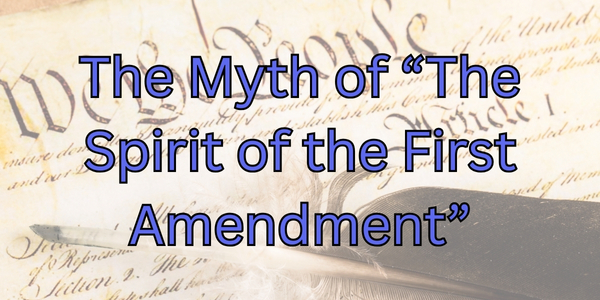If you spend any time online, you’ve probably seen people defend hateful or harmful speech by appealing to “the spirit of the First Amendment.” It’s a phrase that gets thrown around a lot, usually as a way to argue that freedom of speech means you can say whatever you want without consequences.
The problem? That’s not what the First Amendment is about. Let’s break down where this idea goes wrong—and what the true purpose of freedom of speech really is.
What the First Amendment Actually Says
The text of the First Amendment begins with:
“Congress shall make no law … abridging the freedom of speech, or of the press …”
Notice the first word: Congress. The amendment is a restriction on government power. It was written to stop the government from silencing people—especially those who criticized leaders, policies, and institutions.
The Founders knew firsthand what it was like to live under British rule, where criticizing the Crown could land you in jail under charges of seditious libel. That experience directly shaped protections for dissent in the new nation.
The Real Purpose: Protecting Dissent
At its core, the First Amendment safeguards dissent. It gives people the right to speak truth to power, to challenge corruption, and to hold leaders accountable.
This principle was tested early. In 1798, the Alien and Sedition Acts made it a crime to publish “false, scandalous, and malicious writing” against the government. The backlash to those laws—seen by many as unconstitutional—helped cement the understanding that free speech exists above all to protect political criticism of government leaders.
The Common Myth
Some people believe freedom of speech means:
- They can say whatever they want, anywhere.
- They’re protected from criticism or consequences.
- Private companies or individuals must give them a platform.
None of that is true. The First Amendment does not:
- Stop employers, schools, or platforms from setting rules.
- Protect speech that incites violence or makes true threats (see Virginia v. Black, 2003).
- Shield speech that amounts to imminent lawless action (Brandenburg v. Ohio, 1969).
- Prevent society from responding to offensive or hateful ideas.
Freedom of speech shields you from government punishment—not from social accountability.
Why Misusing “The Spirit” Matters
When people invoke “the spirit of the First Amendment” to defend spreading hate, they twist its meaning. The amendment was never about protecting harmful speech from consequences. It was about protecting the powerless from the powerful—ensuring citizens could challenge their government without fear.
Case law reinforces this. In New York Times v. Sullivan (1964), the Supreme Court ruled that even false statements about public officials must be protected unless made with “actual malice.” Why? Because protecting robust criticism of government was seen as more vital than protecting officials from embarrassment.
By misusing the phrase, we risk undermining what the First Amendment was truly designed to do: guard democracy by protecting dissent.
Final Thoughts
The next time someone claims “the spirit of the First Amendment” as a defense, remember this:
- The First Amendment protects you from government retaliation.
- It doesn’t guarantee a free pass to say anything, anywhere.
- Its real purpose is to keep power in check by protecting dissent against government.
The “spirit” isn’t about shielding hate—it’s about safeguarding democracy.
